News | Student Life
Shafik authorizes NYPD to sweep ‘Gaza Solidarity Encampment,’ officers in riot gear arrest over 100
All students identified as being involved in the encampment have also been suspended, Shafik wrote to the NYPD.
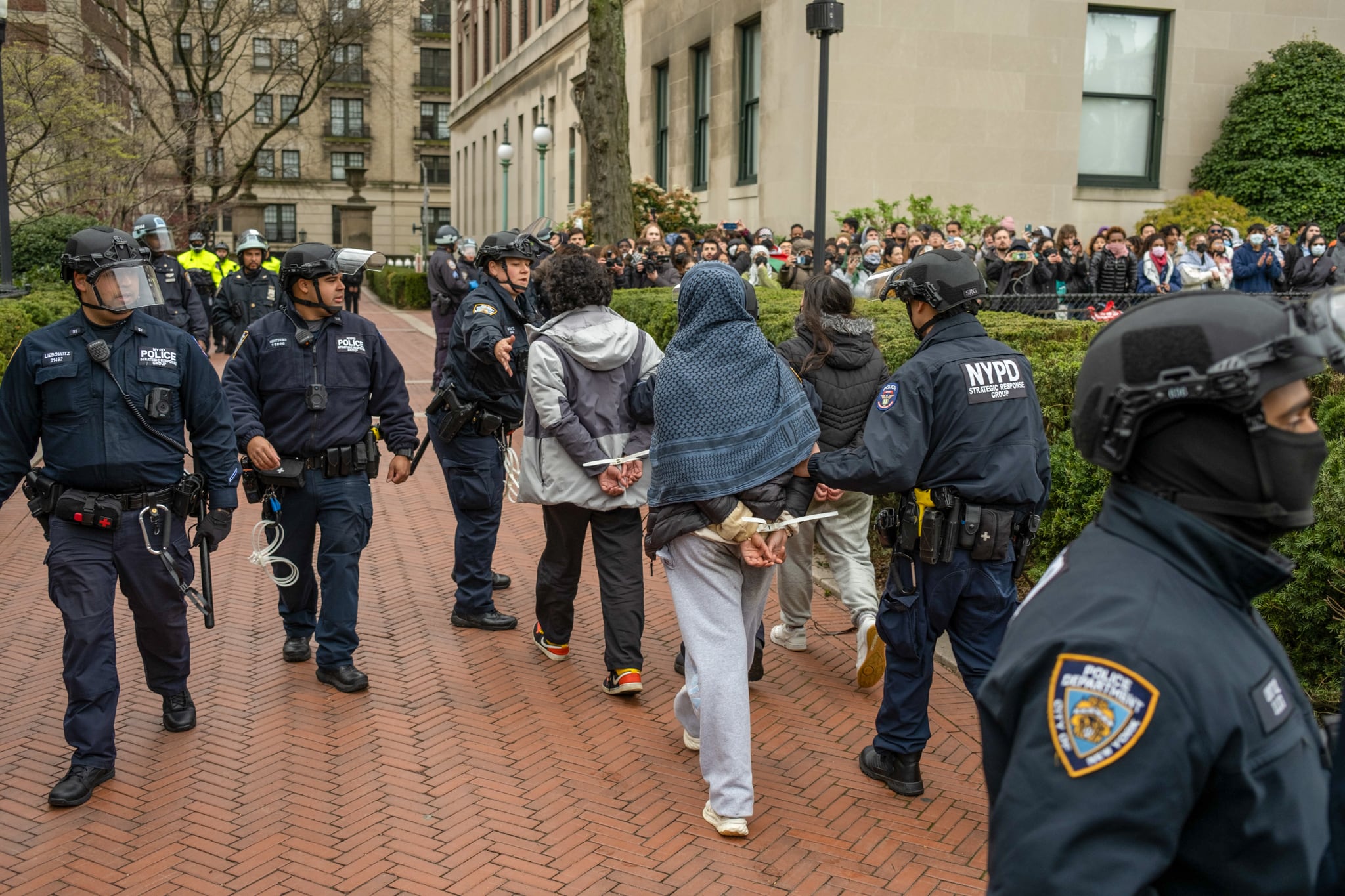
By Stella Ragas / Staff PhotographerShafik notified the campus community in an email on Thursday afternoon that she authorized NYPD on campus in accordance with Section 444 of the University statutes.By Maya Stahl, Sarah Huddleston, and Shea Vance • April 18, 2024 at 5:43 PM
By Maya Stahl, Sarah Huddleston, and Shea Vance • April 18, 2024 at 5:43 PM
This is a developing story. Check back for updates.
Updated on April 19 at 1:25 a.m.
The New York Police Department arrested over 100 individuals after University President Minouche Shafik authorized the NYPD to sweep the “Gaza Solidarity Encampment” on South Lawn at around 1 p.m. on Thursday.
In her letter to the NYPD authorizing the arrests, Shafik wrote that “All University students participating in the encampment have been informed they are suspended.”
Mayor Eric Adams confirmed in a Thursday evening press conference that the NYPD arrested over 108 protesters. Adams said that there was “no violence or injuries during the disturbance.” All arrested individuals had been released from custody by 10:36 p.m. on Thursday, according to two Law School students. The students told Spectator they were doing “legal intake” for individuals as they were released from police custody at One Police Plaza.
The encampment was moved to the opposite lawn after the sweep, where the demonstration was continuing as of Friday morning.
Chief John Chell said that it was Shafik, not the NYPD, who identified the demonstration as a “clear and present danger.”
“To put this in perspective, the students that were arrested were peaceful, offered no resistance whatsoever, and were saying what they wanted to say in a peaceful manner,” Chell said at the conference.
Several protesters were carried out as the NYPD began filling correctional buses on 114th Street. Officers blocked off 114th Street between Broadway and Amsterdam Avenue. A number of professors chose to cancel class as the protests ensued.
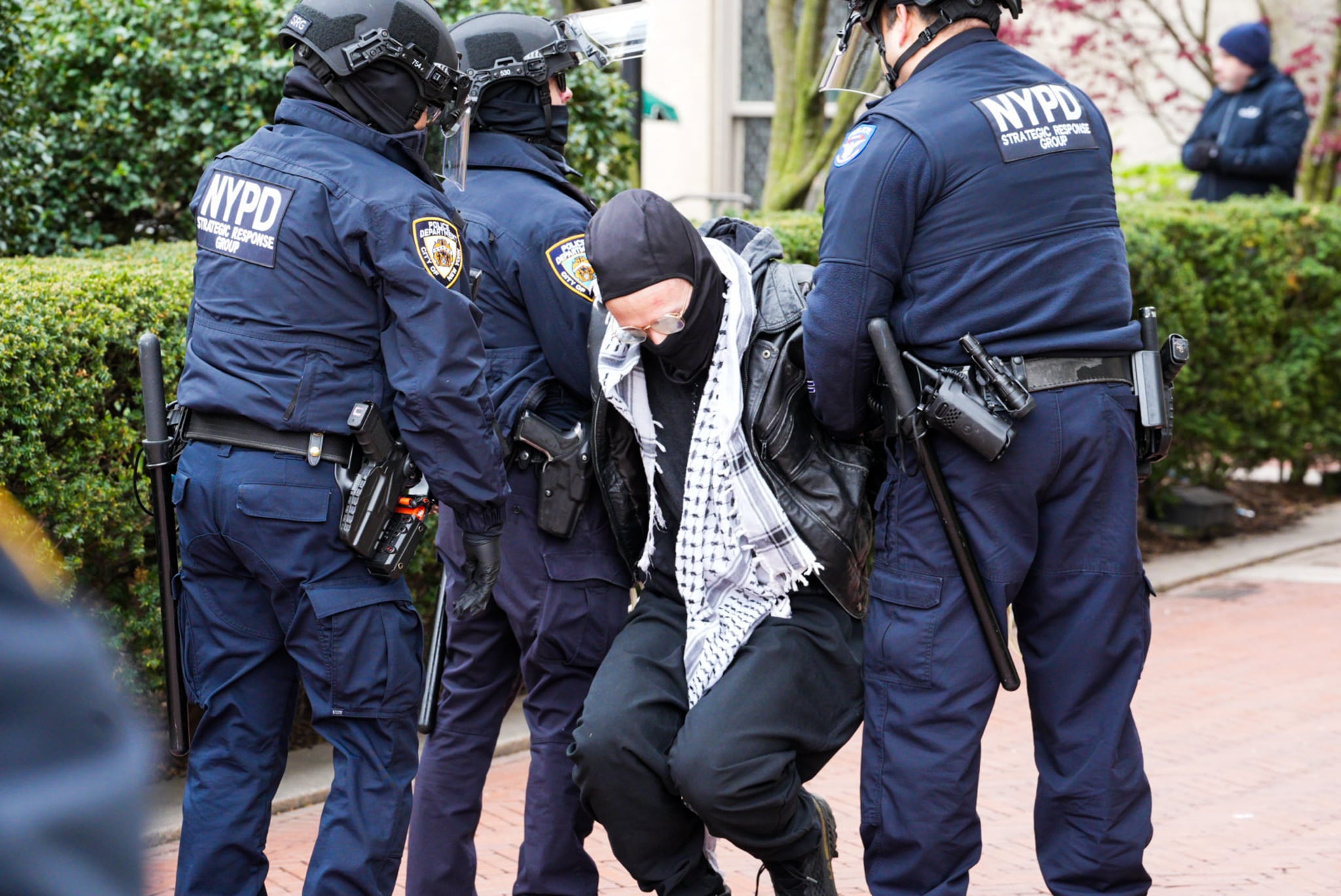
Photo by Gabriella Gregor Splaver / Senior Staff Photographer
The NYPD forcibly carried several demonstrators off campus.
This is the largest instance of mass arrests to be made on campus since 1968, when the NYPD arrested hundreds of students occupying Hamilton Hall and used excessive force in detaining students protesting against the Vietnam War and the planned construction of a gymnasium in Morningside Park.
Police took arrested demonstrators to One Police Plaza, where a contingent of protesters have gathered as they wait for releases, work to provide legal support, make care packages, and write letters of support for those detained.
At least two legal observers, identifiable by their green hats, were among those arrested.
The encampment began in the early hours on Wednesday, shortly before Shafik began her testimony in front of the House Committee on Education and the Workforce regarding antisemitism on campus. Shafik faced dozens of questions grilling her on the University’s response to pro-Palestinian protests on campus since Oct. 7, 2023.
At around 1:20 p.m., NYPD informed protesters that they would now be placed under arrest for trespassing after protesters did not disperse, pursuant to a previous message relayed by the officers. Officers from the NYPD Strategic Response Group then began arresting students roughly seven minutes later. Officers carried batons and had zip ties on their persons.
Arrested students were forcibly removed from campus and loaded onto correctional facilities buses, as hundreds of students looked on from outside the lawn. By around 2:10 p.m., one correctional bus had filled up with detained protesters.
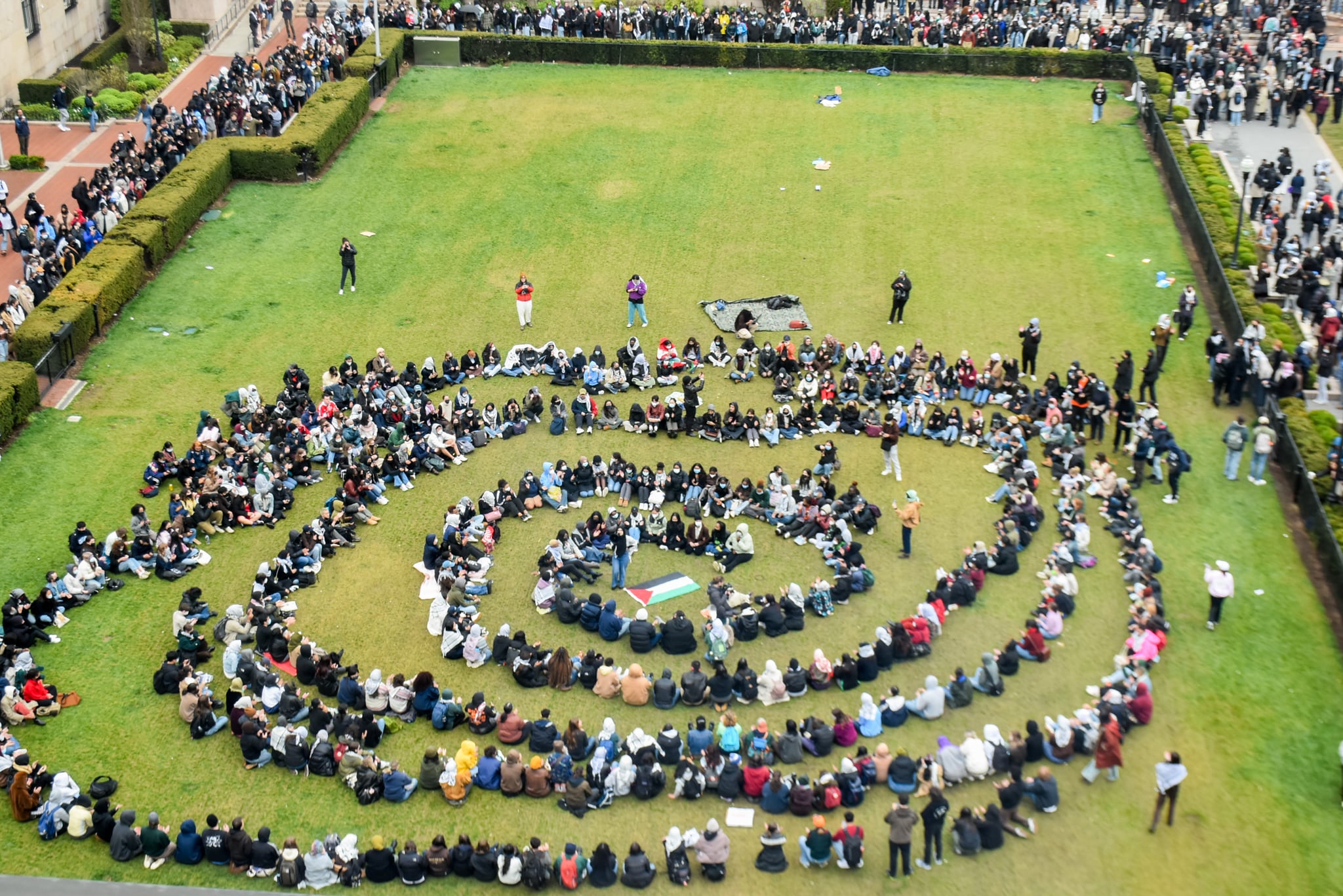
Photo by Judy Goldstein / Senior Staff Photographer
Demonstrators formed circles on the opposite lawn as police swept the encampment
The Office of Multicultural Affairs sent an email to students on Thursday afternoon regarding the “intense upset and distress that continue to play out across campus.” The office will be holding a drop-in gathering space on Friday “for students to be in community and check-in with each other.”
Kristen Shahverdian, PEN America program director of campus free speech, condemned the student arrests in a statement to Spectator.
“It is disturbing to see a campus move so quickly to arrest students for peacefully expressing their political views within the free speech zone, and it is even more alarming that this action came amidst political pressure to crack down on pro-Palestinian expression on campus after yesterday’s hearing in the House,” Shahverdian wrote.
Shafik notified the campus community in an email on Thursday afternoon that she authorized NYPD on campus in accordance with Section 444 of the University statutes.
The executive committee of the University Senate—the body that the President should consult pursuant to Section 444—did “not approve the presence of NYPD on our campus at this time,” an email, obtained by Spectator, to Shafik sent on the behalf of faculty and student members of the executive committee reads.
“The executive committee did not approve the presence of NYPD on campus,” Jeanine D’Armiento, chair of the executive committee, said in an interview with Spectator, adding that the committee made the decision “unequivocally.”
Section 444 states that the president can authorize “external authorities” if, after consulting the executive committee, it is decided that a “demonstration poses a clear and present danger.” Shafik consulted with the executive committee prior to her decision, according to three executive committee members.
In a statement to Spectator, a University official wrote that Shafik “consulted with the Senate Chair to comply with the consultation requirement.”
“The Senate does not have to approve the decision,” the spokesperson wrote, citing the language in Section 444 that reads: “Nothing … shall be construed to limit the President’s emergency authority to protect persons or property.”
“Out of an abundance of concern for the safety of Columbia’s campus, I authorized the New York Police Department to begin clearing the encampment from the South Lawn of Morningside campus that had been set up by students in the early hours of Wednesday morning,” Shafik wrote in her email.
The chairs of the executive committee sent a statement to constituents on Thursday evening, “vehemently” condemning the decision to bring police to campus and the subsequent arrests.
“We will continue to stand against such measures and uphold the principles of shared-governance across all our constituencies,” the committee members wrote. “We want to reaffirm our resolute dedication to the student body and to reaffirm that the Faculty and ourselves, on the University Senate Executive Committee, have strongly and unanimously refused police presence and police action on our campus.”
Abhyudaya Tyagi, a student at the Graduate School of Arts and Sciences, said that Shafik, the NYPD, and Public Safety should feel “deeply ashamed.”
“I think this is a disjuncture in Columbia’s history. For 50 years, NYPD was not allowed to enter campus. And the fact that they have done so is frankly shocking,” he said. “I don’t think the relationship between the student community and the grad student community and the faculty and the admin will ever be the same. I don’t think this institution will, frankly, ever be the same.”
The Knight First Amendment Institute at Columbia University released a statement regarding the arrests on Thursday evening.
“We were surprised and dismayed by the University’s decision to engage the NYPD to dismantle a student encampment and arrest dozens of students who were involved in a protest that by all available accounts was peaceful,” Jameel Jaffer, the institute’s executive director, wrote.
Jaffer wrote that while the University has the right to reasonably regulate the time, place, and manner of demonstrations, the engagement of external bodies should be “only a last resort.”
“It’s not evident to us how the encampment and protests posed such a danger, even if they were unauthorized. And involving dozens of police officers in riot gear creates its own risks—to safety but also more broadly to the character of this community,” Jaffer wrote. “We don’t have all of the information that the University has; perhaps we would view this situation differently if the University explained its decisions more fully. But we are extremely skeptical that engaging the NYPD in this way, at this scale, will turn out to have served this community well.”
After two days of massive police presence, over 50 officers swarmed onto campus, entering the bounds of the encampment in riot gear as they began unzipping tents and circling the protesters remaining on South Lawn.
“You are currently participating in an unauthorized encampment: Gather your belongings, disperse from the lawns, and leave the encampment. If you do not disperse you will be arrested and charged with trespassing,” an officer announced to protesters over a megaphone.
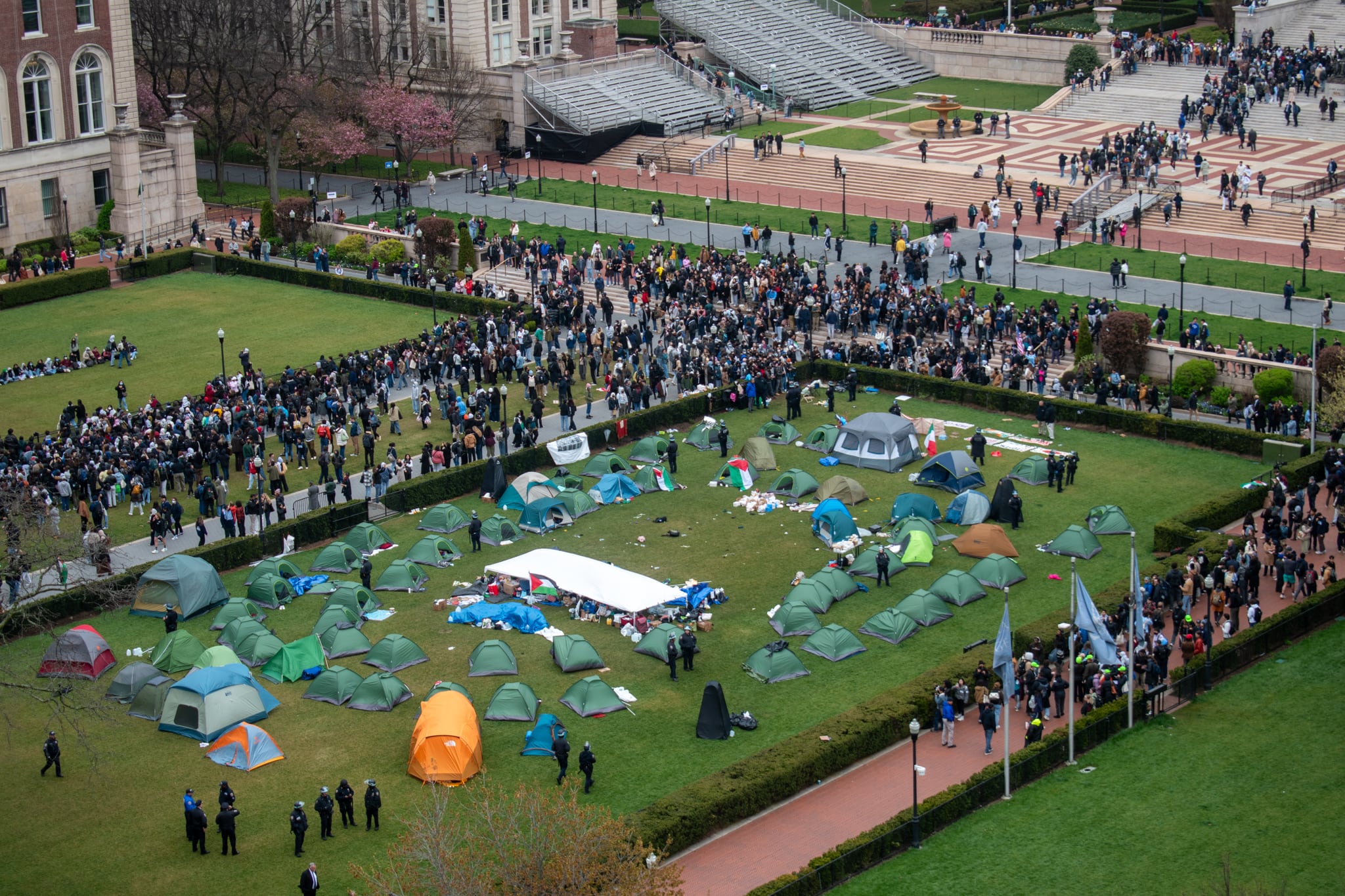
Photo by Sydney Lee / Senior Staff Photographer
Spectators surrounded the encampment as the sweep went on.
On Thursday morning, three Barnard student organizers were placed on interim suspension for the unauthorized encampment. Both Columbia and Barnard students were notified they would be placed on suspension at 9 p.m. the night before if they did not leave the encampment.
Columbia College Student Council posted a statement on Instagram at around 2:05 p.m. condemning the threat of suspension and expulsion of students from campus. The statement was published following the arrest of students.
“At this time, Columbia College Student Council (CCSC) wants to reaffirm our belief that students possess the inherent right to engage in peaceful protest without fear of retribution or harm,” the CCSC statement reads. “We would like to express our firm advocacy for the preservation of freedom of speech and expression among students.”
Barnard’s Student Government Association released a statement condemning the “illegitimate suspension” of Barnard students participating in a “peaceful protest.”
“To immediately suspend members without due notice violates the sanctity of the academic institution and its purpose to facilitate open dialogue. Our affected students—who are Black, Brown, and Jewish—immediately lost access to basic necessities to live. The College is making these students food-insecure and homeless, with no reasonable evacuation timeline,” the SGA statement reads.
The Engineering Student Council released a statement reaffirming students’ right to feel safe on campus, and that free speech and free expression must be preserved.
“The threats of suspension and the presence of NYPD on campus have left us feeling extremely concerned. While the university has policies in place, we firmly believe that the repercussions for peaceful protest should not escalate to arrest or suspension. Our campus should feel safe, and we will continue to advocate for all students’ protection and well-being,” the ESC statement reads.
The General Studies Student Council released its own similar statement on Thursday evening, echoing the sentiments shared by the three other councils. The council urged the University to reverse the suspensions and remove the arrests.
At around 2:18 p.m., hundreds of students began flooding the west side of South Lawn.
NYPD officers and University employees began removing tents and protesters’ items from South Lawn following the arrest and removal of protesters from campus.
Cornel West, a 2024 presidential candidate and professor at the Union Theological Seminary, arrived on the west side of South Lawn and gave a speech to demonstrators at around 3 p.m.

Photo by Gabriella Gregor Splaver / Senior Staff Photographer
Cornel West gave a speech to demonstrators.
In an interview with Spectator, West spoke on the importance of showing up in solidarity with the protesters on the lawns.
“Deed and word makes the difference, that’s the fundamental sign of commitment—you put your body where your commitment is, very important, especially at a time when people are in denial about all the suffering that’s taking place,” West said.
In an interview with Spectator, CCSC Vice President of Campus Life Anand Chitnis, CC ’25, said that he holds “such strong contempt” for Shafik’s statement, which said that the protest “severely disrupts campus life.”
“Protest and discourse on this campus is the reason I came here, the reason I run for this role, it’s everything that I try to protect in everything I do,” Chitnis said. “And so the idea that she believes that bringing NYPD on campus helps that campus life is heartbreaking, is disheartening, I literally left class sobbing because I was like ‘I cannot believe I go a University where this is the primary value that is being held over everything else.’”
CCSC Class of 2025 Vice President Rohan Mehta, CC ’25, said that the statement was drafted prior to the protests and condemned the University’s handling of the protest.
“The clear way that the University is willing to treat their students is so reprehensible, I think it’s caused me to lose all faith in Minouche Shafik and her administration,” Mehta said. “I’m so disappointed in this University and I think we’ll be seeing stronger language from CCSC hopefully soon.”
CCSC President Teji Vijayakumar, CC ’24, said that the council decided to release a statement in order to support its student body following the escalation of University action against the protesters Wednesday evening.
“I’m feeling really terrible. I wish that there was more I could do,” Vijayakumar said. “I’ve been running around all day trying to get a hold of any administrator I can. Even when I do, I’m met with, ‘Oh, I am not the one making decisions,’ or ‘There’s nothing I can do,’ or something like that. It’s very frustrating.”
“But obviously, I’m mostly just upset that it doesn’t seem like the school is doing anything to protect our students,” Vijayakumar said.
A group of counterprotesters gathered outside Butler around 2:45 p.m., holding Israeli and U.S. flags. Counterprotesters began singing the national anthem and other songs after West’s speech to students.
“Columbia can either be a world-class place of research and learning, or we can be an institution that resorts to law-and-order responses to protest even when there’s no threat to safety or operations, but we can’t be both,” Joseph Howley, professor of classics, wrote in a statement to Spectator. “I wish the last few months had left me with greater confidence that the University’s response today was about how the students were protesting rather than what they were protesting.”
Public Safety released a statement at 3:45 p.m. alerting students that Facilities and Operations is ensuring that the belongings left on South Lawn “are being carefully stored, not discarded.”
Protesters on the lawn began re-erecting tents on the west side of South Lawn around 3:45 p.m. as hundreds of protesters continued to gather in solidarity. Organizers instructed participants to be aware of the risk of staying, asking them to be ready to make a decision in the moment regarding whether or not they are willing to risk arrest.
Palestinian poet and activist Mohammed El-Kurd arrived on South Lawn at around 4:30 p.m. and delivered a speech. El-Kurd said that “students have liberated this part of Columbia”
“I came here to support this historic encampment and this historic show of solidarity, and protest against the genocide that the Israeli regime is waging against the people in the Gaza Strip,” El-Kurd said in an interview with Spectator. “I think Columbia’s investment in the killing of my people is beyond the pale, particularly for an institution that says it celebrates democracy and values of human rights and all of that bullshit they tell us while doing the exact opposite of it.”
Donna Lieberman, executive director of the New York Civil Liberties Union, criticized the arrests in a Thursday statement.
“Coming as it does amid heavy-handed pressure from Congress to clamp down on student protest that criticizes Israel, Columbia’s excessive response raises further concerns about its commitment to free expression,” Lieberman said in the news release. “Columbia should be creating an environment that encourages people to speak out, participate in hard discussions, and engage with global events — not rushing to call the cops on their own students.”
At around 4:50 p.m., demonstrators formed a picket line around the lawn, chanting “Free, free Palestine.”
Mariame Sissoko, BC ’24, SGA president, told Spectator that SGA was not notified that the administration was planning to suspend students nor allow NYPD on campus. They said SGA has repeatedly “pushed back” on administrative plans to allow police on and around campus.
“We were, one, shocked that they would allow NYPD onto our campus. We were not notified of them allowing NYPD onto the campus or letting any of the student governments or any elected body including the University Senate know. And frankly, I would say we’re angry about it,” Sissoko said. “Students are exercising their right to peacefully protest and to allow [the NYPD] onto this campus for the first time in 50 years, since 1968, is a little bit ridiculous.”
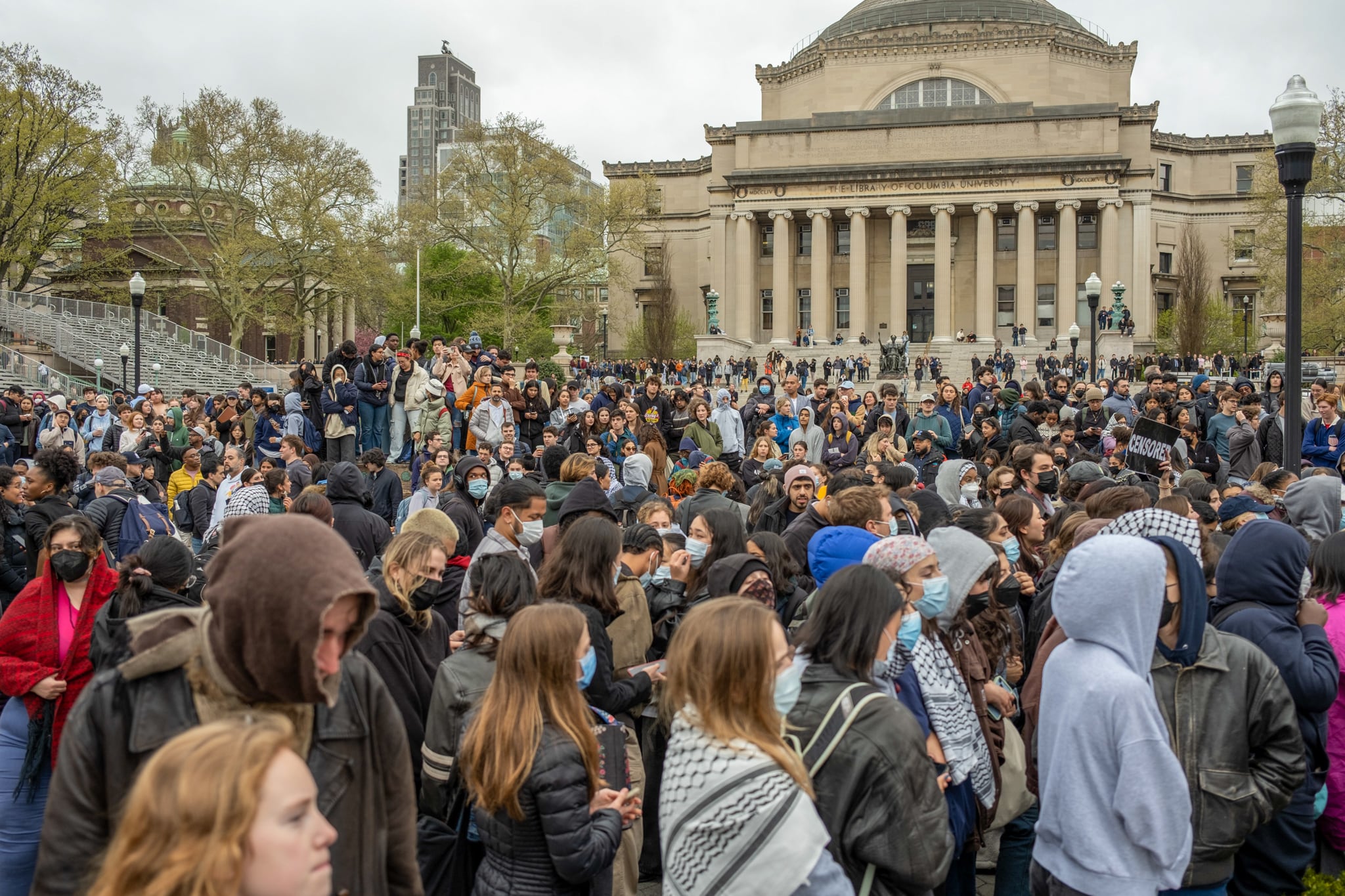
Photo by Stella Ragas / Staff Photographer
Demonstrators and spectators looked on as police swept the encampment
Aurelia Tan, BC ’25, vice president for equity, said SGA is in coordination with Columbia Public Safety, the Engineering Student Council, and General Studies Student Council to retrieve student protesters’ belongings from South Lawn. Sissoko added that SGA is coordinating with the other Seven Siblings colleges to release a statement in support of the Barnard-Columbia Abolition Collective jail fund to financially support arrested students.
Barnard SGA postponed its scheduled candidates’ forum following the suspension and arrest of Barnard students, according to Emily Lan, BC ’24, vice president for policy. In lieu, the executive board is now offering a space for students to gather and express their concerns.
On the west side of South Lawn, hundreds of protests continued to display banners reading “Gaza Solidarity Encampment” and “Join us.” Protestors chanted “Students, students hold your ground, NYPD back down.”
One Barnard professor who spoke to Spectator under the condition of anonymity, citing safety concerns, said that the actions taken by Barnard administration are “actions of great violence.”
“There’s no going back to what the University was last night, this is an egregious attack on any principle of education,” the professor said. “I was teaching my students in class today and saying we think a lot about education and how we teach and the lesson today is compliance. They can’t replace professors with police and have a university, but it seems that that’s the direction we are going.”
At around 6 p.m. the NYPD began releasing protesters from police custody.
Maryam Iqbal, BC ’27, a student organizer and one of three Barnard student organizers who were initially suspended and arrested, was released from police custody at around 7:45 p.m.
“Just got out of jail after Columbia called NYPD to mass arrest 100+ students. I have been suspended and evicted from housing by Barnard,” Iqbal posted to X. “This has only strengthened my commitment to the movement for Palestinian liberation and I promise to continue fighting for divestment.”
Public Safety created a web page titled “Information about items left on South Lawn” claiming the University is “committed” to returning all items. The web page states that the University is placing all items left from the encampment in storage and that logistics for picking up personal belongings are “currently being worked out.”
All four undergraduate student councils are working together to release more information on how students can retrieve personal items.
SGA released a letter on Instagram around 7:30 p.m. calling on Barnard Provost Linda Bell to cancel all classes for April 19, “in response to the feelings of distress and unease among all students on campus.”
Staff Writer Chris Mendell, Senior Staff Writer Ariel Yu, Senior Staff Writer Gelila Negesse, Senior Staff Writer Rebecca Massel, Managing Editor Esha Karam, City News Editor Manuela Silva, Deputy News Editor Claire Cleary, Deputy Copy Editor Sophia Lee, Deputy Copy Editor Ainhoa Petri-Hidalgo, Deputy News Editor Sabrina Ticer-Wurr, Deputy News Editor Apurva Chakravarthy, Senior Staff Writer Andrew Park, Deputy Photo Editor Judy Goldstein, Staff Writer Joseph Zuloaga, Staff Writer Daksha Pillai, and Head of Investigations Amira McKee, Deputy Photo Editor Gabriella Gregor-Splaver, and Deputy City News Editor Chimene Keys contributed reporting.
Deputy News Editor Maya Stahl can be contacted at maya.stahl@columbiaspectator.com. Follow Spectator on X @ColumbiaSpec.
University News Editor Sarah Huddleston can be contacted at sarah.huddleston@columbiaspectator.com. Follow Spectator on X @ColumbiaSpec.
University News Editor Shea Vance can be contacted at shea.vance@columbiaspectator.com. Follow her on X @SheaVance22.
Want to keep up with breaking news? Subscribe to our email newsletter and like Spectator on Facebook.
More In News
Editor's Picks



